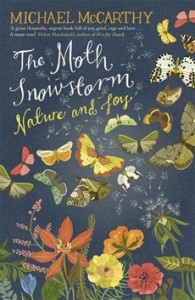The publisher's blurb for Michael McCarthy's new book, The Moth Snowstorm: nature and joy, begins like this:
Nature has many gifts for us, but perhaps the greatest of them all is joy; the intense delight we can take in the natural world, in its beauty, in the wonder it can offer us, in the peace it can provide - feelings stemming ultimately from our own unbreakable links to nature, which mean that we cannot be fully human if we are separate from it.
That this is a gift is without doubt, but surely not the greatest. That has to be our continuing existence as a species. Despite our significant effort to disrupt nature's support of humanity, we remain part of its nurturing, if rather edgy, web, and it would be well were more people to understand just how embedded and dependent we are. This ought to be one of the prime goals of any environmental education worthy of the name.
But, you may say, all that's rather rational, and joy is quite a different sort of response. And, you might add, our attempts to be rational about the sustainability problematique have not got us very far. Inded, this inadequacy is part of what McCathy's writes about. Here's the blurb again:
... Michael McCarthy ... proposes this joy as a defence of a natural world which is ever more threatened, and which, he argues, is inadequately served by the two defences put forward hitherto: sustainable development and the recognition of ecosystem services.
There's a reminder in all this of John Foster's After Sustainability. McCarthy's book has been well-received. Here are a taste of the comments c/o the publisher:
"Impassioned, polemical and personal ... In the autobiographical passages nature is a marvel and a solace. [McCarthy's] descriptions of the night-time clouds of moths – the moth snowstorms of the title – that we saw in the days before farming ruined so much natural habitat are unforgettable, and his recollections of boyhood bird-watching on the River Dee Bay a delight ... At its heart, this is a book aiming to persuade those who are broadly sympathetic to think in a different way, and in that it is surely a success – and a joy" – Independent
"McCarthy has for years been the doyen of environmental correspondents ... he is conversant with the hard facts, the political realities and the moral complexities of the conservation world. But he writes also as a man inspired by the beauty, diversity and abundance of the natural world that we are destroying. This combination of worldly wisdom and deeply felt personal experience makes this a highly original and refreshing account of our current predicament" – TLS
I've read the full review in the Spectator. This is by Mark Cocker, author of Claxton: Field Notes from a Small Planet. It begins:
"Despite the offer of joy proposed in the subtitle, this is a deeply troubling book by one of Britain's foremost journalists on the politics of nature. Michael McCarthy was the Independent’s environmental editor for 15 years, and his new work is really a summation of a career spent pondering the impacts of humankind on the world’s ecosystems. The case he lays bare with moving clarity in the opening chapters is compelling stuff. Essentially he argues that the world of wild creatures, plants, trees and whole habitats — you name it — is going to Hell in a handcart as a consequence of what he calls ‘the human project’."
and ends:
"Alas, neither joy nor biophilia is making too much head way in altering our relations with nature. One wonders if shock and shame might be necessary for us to undergo a collective change of heart. Either way, McCarthy gives us both barrels in this powerful, heartfelt and compelling book."
After all this, I'm still undecided about whether to read this book. Not because it's poorly written, or that its arguments are unsound – quite the reverse by the feel of it. Rather, I wonder whether my time would be better spent either in nature, or agitating on its behalf. The former sounds more appealing of course because, as McCarthy says, there's much more joy to be found there. But that's the trouble with joy, its appeal can feel self-centred, and where would we be if we all pursued it all the time?
Respond
